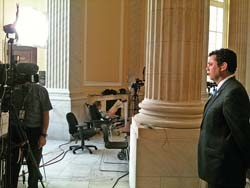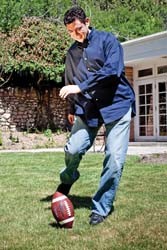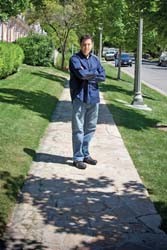
It’s late spring in D.C., and the heat level is a slow Potomac bake. Utah 3rd District Congressman Jason Chaffetz enters his office after attending a joint session at the Capitol Rotunda to hear Israeli Prime Minister Benjamin Netanyahu speak. The scene outside was hectic, even for the nation’s capital: a half-dozen identical black SUVs waited, ready to squire away the Israeli entourage, and nearby security guards, looking bored, rested sweaty palms on the butts of their M16 machine guns. Protesters chanted across the street and lobbyists circled the Capitol like sharks.
At Constitution Avenue, a lobbyist in a black pinstripe suit joked about jaywalking as he and a colleague darted across the street. “Yeah, in D.C., laws are kind of a suggestion,” one says to the other, with a chuckle.
The Netanyahu visit has thrown off the congressman’s already jam-packed schedule by hours. Chaffetz’s pressing concern at the moment, however, is rats. The proximity his first-floor office has to the ground unfortunately makes it easy for vermin to get in. “The rats I usually deal with are wearing a tie,” Chaffetz says, flashing his Cheshire cat grin as he points out the traps he’s set around his office. All the while, a staff member is warning Chaffetz that visitors are waiting to see him.
Still, Chaffetz manages to sneak in an extra 10 seconds to show where his ballyhooed cot folds out and to point out with distress that he’s had to place mousetraps near his bathroom/changing room/closet. “That’s where I keep my undies,” he says with disgust before returning to his main office as groups begin filing in to bend his ear.
Spring in D.C. is the time when humidity mixes with politicking, spitfire idealism, salty cynicism and plain old-fashioned BS—bipartisan BS, at least. After two years as Utah’s newest congressional delegate, Chaffetz has acclimated to this sweltering environment. No longer a freshman but still a newcomer, Chaffetz has learned to manage a dizzying schedule of voting, making radio and TV spots and holding forth with a diverse constituency, many with their hands out. Chaffetz, as a rule, says no to federal spending projects, even when a prominent Utah road-construction company asks if thousands of out-of-work Utah construction workers justify a hard line in the Republican budget on transportation funding.
“That argument comes with no end,” Chaffetz counters with polite exasperation. “Of course, why don’t we spend 200 percent? Then everyone will be better. Maybe you’re not liking what you’re hearing here, but it’s the naked reality of what goes on in this building. This nation is bankrupt.”
He’s learned the ins and outs of the Capitol, the “People’s House.” He can navigate the labyrinth of tunnels that connect the House and Senate buildings like an underground city that includes cafeterias, travel agencies, gift shops and even a train. He’s learned to carry his own earpiece for TV interviews after once having to use Texas Republican Rep. Ron Paul’s less-than-clean one. “I learned that one the hard way,” Chaffetz says.
But while he knows his way around, being a new kid on the block is a role he clearly likes to play. And he might like to be a new kid on the Senate block if he could oust Republican Orrin Hatch, the 35-year Senate incumbent.
Jason Chaffetz was 9 years old in 1976 when Orrin Hatch first took office as a Utah senator. While freshman Hatch was learning the ropes and making a name for himself as a young conservative upstart, Chaffetz—like a typical 9-year-old—was entirely apolitical, nonreligious and unambitious—except when it came to kicking.
From the beginning, Chaffetz was running and kicking. He played soccer in Southern California youth leagues, dreaming of someday achieving Pelé-esque magnificence. Thirty-five years later, in his D.C. office, he fidgets with a football, a reminder of his kicking career for Brigham Young University.
For Chaffetz to take on Hatch—which insiders say is all but a given—will take skill and politics. For Chaffetz, it will mean sticking to a game plan that has taken him from soccer player to BYU Cougars placekicking record-holder to an incumbent-toppling, tea-party insurgent in D.C.
For some critics, Chaffetz’s affable—nay, goofy—laid-back charm is a veneer that covers an ambitious and opportunistic politician. Indeed, things have changed, and dramatically so, in the Chaffetz playbook—for example, his switching teams from his early days as a Dukakis Democrat to that of a tea-party Republican. And, for that matter, his conversion from an agnostic West Coaster to a member of The Church of Jesus Christ of Latter-day Saints.
“The most important thing I’ve found is just being humble enough to know that life as we know it is not just a big coincidence,” Chaffetz says. Critics who see Chaffetz as a right-wing extremist, or potential rivals like Hatch who see Chaffetz’s actions in line with the “far left,” also recognize in him a powerful drive—the kind that doesn’t happen by accident.
Chaffetz felt a call to the LDS faith early on, before he ever knew what a Mormon was. Before he undertook the grueling task of running for office, he learned a work ethic from a hard-working father, one who ran a strict household and one whom a childhood friend describes as a hard-nosed man seldom around in Chaffetz’s adolescence. He was a man who nevertheless encouraged Chaffetz to push himself through athletics, business and, perhaps, now to the office of the U.S. Senate. It’s the same drive that infuriates critics like blogger and one-time Independent challenger to Chaffetz in the 2010 election, Joseph Puente.
“We’re talking about a man who, years ago, registered the domain name ‘ChaffetzForSenate,’ ” Puente says. “He lives in a fantasy world where he’s win, win, win all the way.”

California Dreaming
Political consensus-building can be nauseatingly repetitious to watch as politicians condense complex ideas into tidy talking points. Chaffetz can hold his own, stating concise positions on Afghanistan, the debt ceiling, Medicare and other tough issues, boiled down to slogan-like simplicity. He even has a talking point about himself:
“I’ve always said, ‘So few people raise their hands,’” Chaffetz says. “‘And those who do make all the difference.’” Most every task he’s raised his hand for, he’s thrown himself into with manic gusto and an unrelenting discipline.
His earliest memories are of himself as a young tyke cruising on his family’s deck on his Big Wheel chased by his sheepdog named Socks. The Chaffetz household was often on the move in those days, thanks to the ever-changing business life of Jason’s father, John Chaffetz, who worked at a convertible dealership called the Little House of Hardtops and as a sports broadcaster for a local radio affiliate. By the time Jason was 9, the family had moved to Southern California, where his father had become a general partner—with Elton John as co-owner—of the Los Angeles Aztecs soccer team. The Chaffetz boys were given regular introductions to celebrities ranging from Rod Stewart to Bill Cosby. Jason’s godfather was Dodgers legend Sandy Koufax, a friend of John Chaffetz.
Harlan Glatt, a government employee in Southern California, recalls his double-take in 2009 when he spotted his childhood friend leg wrestling on Comedy Central’s The Colbert Report. “I got my brain twisted seeing him,” Glatt says, adding that he wasn’t too surprised. “He had all the makings of a Republican politician.” Glatt was a friend from junior high school who played soccer with Jason, hung out after school with him and went to a few Aztecs games with Jason and his father.
While Chaffetz describes his formative years as being a “skinny geek,” Glatt calls that “false modesty.”
“He cared very much about his popularity to the extreme,” Glatt says. “He cared what people thought about him all the time.”
Looking back now, Glatt says the arc of Chaffetz’s career matches the ambition he displayed back then. “He always wanted to be on the winning team,” Glatt says.
Glatt also remembers Jason’s father as a man known to bark orders. “He just wasn’t very friendly,” Glatt says. “It was always ‘tuck in your shirt,’ ‘tie your shoes.’” The other thing Glatt noticed about Chaffetz’ dad was his absence. “[Jason] always had a lot of Christmas gifts, there was always something to play with at his house. It could have been there was a lot of gifts because his dad was not present that much.” Chaffetz criticizes Glatt’s characterization of his homelife as an “11-year-old’s perspective.”
Make Your Own Luck
John Chaffetz, at 75, echoes his son’s laid-back nature in his speech. He warns an interview may have to be cut short since his son will be doing a Fox News spot shortly—he never fails to tune in, even with the volume of Jason’s TV appearances.
When asked about his absence when Jason was growing up, John says simply, “I was on the plane a lot,” but when asked if his traveling affected his family life, he admits he’s never considered it nor even been asked about it.
“I knew what I had to do, and there’s no way to dilute that,” John says. “There is no Plan B.” John believes in following a life based on applying oneself full-bore to all manner of tasks. John himself has been a sportscaster, car salesman and hotel manager, and now spends his time writing true-crime novels after having served as a juror on a well-publicized rape case. He now does speaking engagements about the dire need for police departments to test rape kits and log the information instead of leaving the samples on police evidence-room shelves.
John does not deny running a tight ship when he raised Jason and his younger brother, Alex. He does recall a few times when the family was living in Scottsdale, Ariz., that he punished the boys by turning the air conditioning off at night. “I wanted them to know that not everybody lived like we did,” John says
Jason recalls a typical household routine that included chores, a required hour a day of reading, curfews and his dad wiggling his toes to wake him up for school.
But if John was stern with his sons, he says he was not controlling. “I never said, ‘I hope you do this or do that,’ ” John says. “I just wanted them to be healthy and successful in whatever they chose to do.”
He simply impressed upon them one core belief: “Hard work makes good luck.”
In Jason’s high school years, his parents divorced. His school months were spent in Winterpark, Colo., with his father and summers in Arizona with his mother. As a junior in high school, Jason had a crystallizing “raise-your-hand” moment when the high-school football coach encouraged members of the soccer team to try out for placekicker. Jason was the only one who tried out, and he got picked.
“I remember telling Jason, ‘You don’t know the difference between a football and a banana,’” John says. But sensing Jason’s eagerness, they began to learn. John managed to stumble upon Fred Steinfort, a record-holding placekicker for Boston College and former kicker for the Oakland Raiders, among other NFL teams, and recruited him to train Jason.

Soon, Jason’s regimen was five hours of training, seven days a week, for months. Sit-ups, 20-yard sprints, hours of stretching and lots and lots of kicks.
“I can’t even touch my toes these days, but I used to put my heel on the wall above my head and almost do the splits against the wall,” Chaffetz says. “I turned my skinny Ralph Macchio body into one with a pretty good kicking leg.”
John says Jason kicked the football thousands of times before they submitted a video of the kick to various colleges around the country and BYU recruited Jason. “Jason’s last high school game, 74 people saw it,” John says. “And his next game, 65,000 people were on hand for worldwide satellite coverage, and it didn’t faze him a bit.”
D.C. Daze
The reception area of Chaffetz’s office bustles. A Sandy woman calls to complain about the military helicopters that buzz over her yard and blast radio waves that she can feel resonate in her jaw. Dropping by to distribute literature are various citizen lobbyists, including one well-dressed man representing the American Civil Liberties Union. He says he’s urging members of Congress to support an amendment to the defense budget offered by Rep. Justin Amash, R-Michigan, to curtail expanding the president’s wartime authority.
What the young ACLU pamphleteer probably could not have guessed is that Chaffetz was well aware of Amash’s amendment. In fact, in keeping with Chaffetz’s style of holding to principle over politics like other tea-party leaders, not only did Chaffetz support Amash’s amendment, but he would later vote against the defense budget’s passage because the amendment was voted down.
Chaffetz himself would go on to propose a bipartisan amendment that week, one calling for major troop withdrawal from Afghanistan, leaving only contingent forces to respond to surgical, counter-terror ops. Given the recent demise of Osama bin Laden, the idea of assigning special ops over prolonged troop occupation was gaining traction with both parties. The amendment even had the co-sponsorship of Peter Welch, D-Vermont, the House Democrats’ deputy whip.
Chaffetz’s plan for the Rules Committee, where his amendment needed to go before it could be debated in the House, was simple: Keep it short, since the small committee is already overwhelmed.
“You can’t really wax philosophic—you only have about 30 seconds,” Chaffetz says. Inside the committee room, Chaffetz argues that U.S. troops have been extremely successful, but the country no longer needs to be involved in nation building—in 35 seconds flat. He came across confidently, as if passage were a foregone conclusion.
The kick is good.
The committee passes the amendment, and it will be heard in a late-night debate on the House floor. When the amendment finally comes to a vote, it’s voted down 123 in favor and 294 against—including the rest of Utah’s delegates. Ironically, a nearly identical amendment sponsored by two Democrats gathers 204 yea votes and fails by a margin of less than 20 votes. Less than a month later, President Obama would announce plans for expedited troop withdrawal from Afghanistan.
Chaffetz frets over foreign intervention and nation-building, but he’s no peacenik and asserts that saving costs to taxpayers is the greater priority. In fact, the amendment he co-sponsored that did pass that week de-funded the U.S. Institute of Peace, a small diplomatic unit in the Defense Department that works on the ground with U.S. troops to help better relations with the people the U.S. military engages with. The program has been lauded by generals that include Gen. David Petraeus for helping secure the safety of troops by bringing diplomatic finesse to complement the efforts of combat forces. Norman Ornstein of the conservative think tank the American Enterprise Institute jabbed Chaffetz and his co-sponsor’s effort on the amendment as the “Most-Head-in-the-Sand-Neanderthal-Effort” of the year.
Chaffetz takes no umbrage for cutting a tiny chunk out of the bloated defense budget, even if it means de-funding the institute.
As for the troop-withdrawal amendment, Chaffetz laments that House floor debate is limited to only 10 minutes, unlike in the Senate where debate is unlimited.
“Which is also very appealing,” Chaffetz says, flashing a toothy grin at another of his routine hints of a run for senate.
God and Politics
Perhaps Chaffetz’s most dramatic conversions occurred in Utah, discovering his faith and discovering his politics. While his father’s side of the family is Jewish, his mother was raised a Christian Scientist. Chaffetz’s parents taught their children right and wrong but weren’t religious.
Playing football in Utah, Chaffetz found himself ensconced in a hospitable LDS culture. Not a partier growing up, he found Mormonism’s teetotaling ways an easy fit. He met his wife through friends at school, and their early courtship was, in Mormon fashion, incredibly frugal. He took her to a taping of the 10 p.m. news at KUTV 2, where he worked on the weekends doing sports broadcasting.
“Michelle King was my superstar,” Chaffetz says. “She hung out with us afterward—that made me look good.” The second date, they went out for yogurt—Chaffetz had coupons.
Chaffetz admits he didn’t feel a lightning-bolt epiphany about faith, but he did feel comforted, through his soon-to-be wife and the culture in general. Ironically, he recognized the comfort as a feeling he experienced as a child in California, when a thunderstorm was raging outside. His parents were away, and his babysitter said a prayer. The calm Chaffetz felt then was a sensation he would rediscover in Utah.
“When I was just a little squirt, I don’t think I recognized the significance of that,” Chaffetz says. “Part of what happened at BYU is I became mature enough to actually humble myself and get on my knees and pray.”
Chaffetz’s time at BYU was marked by setting three placekicking records for the school, though he’s quick to admit his most important statistic was that his team never lost by the margin of one of his missed kicks.
After college, Chaffetz started working at Nu Skin as an intern and rose to hold various management positions—including in marketing and product development. During his 11 years there, he helped the fledgling multilevel marketing company grow into an international corporation.
While in Utah, Chaffetz gradually embraced conservative politics as he joined the dominant culture. Although Chaffetz grew up a Dukakis Democrat, due in part to his father having once been married to 1988 Democratic presidential candidate Michael Dukakis’ wife, Kitty, it was a prominent Utah family that helped bring him into conservative politics.
“My mother passed away in 1985. She died from breast cancer very young, [in her] early 50s.” Chaffetz says. “It was the same year the Huntsman family started the Huntsman Cancer Institute. I was very touched by that, and I paid more attention to it than most.”
Later, a mutual acquaintance introduced Chaffetz to the Huntsmans. One brief meeting turned into a minor campaign position on Huntsman Jr.’s 2003 gubernatorial campaign, which turned into managing the campaign and later Chaffetz’s appointment as then-Governor Huntsman’s chief of staff, where he fostered crucial relationships with members of the Legislature. A year and a half later, Chaffetz left the administration, but, he says, not because of any serious schism in the office. “Jon made it clear that is was time for a change,” Chaffetz says, “for him and for me.”
With experience running a statewide campaign and managing the governor’s office, Chaffetz felt ready to run for office himself. Rep. Chris Cannon, the 3rd District Republican, looked like a worthy adversary.

Chaffetz said it all came down to hard work. He was willing to work harder than others, and efficiently defeated Cannon with a small volunteer staff while spending less than $100,000. Chaffetz recalls one time getting three delegates to agree to meet him, but he had to get up at 5 a.m. to meet them in Richfield at 7:30 a.m.
“Just to meet three delegates,” Chaffetz says. “Most people don’t have it in their gut to do that. That’s fine. It just created another opportunity for me.”
Hound Dog
While Chaffetz displays a superhuman work ethic, part of his voter appeal is also his natural Joe Average-ness. Utah tea-party leader David Kirkham recalls first meeting Chaffetz at a Glenn Beck rally in 2009. When Chaffetz arrived, all the parking had been taken. Half-expecting Chaffetz to drive up to the stage like royalty, Kirkham says Chaffetz instead parked at a Walmart lot far from the event.
“In his pinstripe suit and wingtips, he walked all the way across this dirt field and came up to me and said, ‘Hi, I’m Congressman Chaffetz,’” Kirkham recalls. “We talked for some time, and it was like I was speaking to anyone else walking by.”
Chaffetz is also accessible to the media—so much so that Hatch recently called him a “publicity hound.” The Salt Lake Tribune’s D.C. correspondent Thomas Burr considers Chaffetz a “rarity” when it comes to press availability. “I swear, if I don’t call him every few days, he’ll call me to see if I need anything,” Burr says.
Not everyone is sold on Chaffetz’s efforts at transparency. Chaffetz constituent Joseph Puente once devoted an entire Website called JasonWatch.org to scrutinizing Chaffetz and his politics. Puente eventually campaigned as an independent against Chaffetz in 2010. After being easily defeated, Puente stopped following Chaffetz so closely.
Puente’s prognosis of his congressman is simple—narcissism. “People who gravitate to public positions often have narcissistic tendencies,” Puente says, citing himself as an example. When Puente ran for office, the Navy veteran posted on his Website his own “dirty laundry,” including a disorderly conduct charge Puente received in 2006 for an argument he had with staff at the local Veterans Affairs office.
“If people didn’t say things [Chaffetz] liked, he kicked them off his page,” Puente says. “A typical need for adulation.”
Puente recalls that when Chaffetz was a freshman, his online “Cotside Chat” videos used to allow users to leave comments until, Puente says, he started leaving critical comments. Puente says he was told by Chaffetz that Republican leaders had suggested the comments be closed.
“I looked at [other Republican lawmakers’ sites], and they have no problem with people leaving comments,” Puente says. Puente’s criticisms also got him booted from Chaffetz’s Facebook page. Chaffetz acknowledges blocking Puente for being “factually inaccurate, rude and condescending” to other commenters. But he says, overall, he’s blocked less than 10 people from Facebook. “I’ve always wanted to be as transparent as I possibly can be.”
Puente also says Chaffetz has long had designs on a Senate seat, pointing to a Website name secured in 2009 by Chaffetz’s Political Action Committee called “ChaffetzForSenate.com.” Chaffetz says the Website was acquired just to secure his domain rights from being taken by cybersquatters.
While Chaffetz has been lauded by pundits for being receptive to his constituents, Puente calls it dishonest politics. “Chaffetz feeds them their ideology, and they like him for it,” Puente says. “But if all you do is tell the people what they want to hear, you’re not being honest with them. Ultimately, it doesn’t serve the public good.”

It’s His Right
While City Weekly enjoyed unprecedented access to Chaffetz during a recent D.C. visit, an interview with Hatch was gained only after stumbling into him at the airport before boarding a flight home to Utah.
Hatch admits it’s possible for novice lawmakers to be effective on the Hill—he should know, because he did it when he was a freshman senator. “In my first two years, I led one of the most important fights in U.S. [labor-law reform] history. No one else was willing to take it on,” Hatch says of a labor battle he says was hard-fought and won by a single vote. “I was able to be effective right off the bat.”
In broad strokes, he sounds like he is describing Chaffetz himself when Hatch talks about his unpopular battles as an upstart newbie on the Hill. Hatch is quick to point out that he’s still got the conservative chops for Utah. “As long as people support me, they will have a very active and strong personality in Washington,” Hatch says. “I’m considered one of the top conservatives in the country—I’m not saying that myself—but I got about a 97 percent conservative voting record.”
In regard to Chaffetz’s troop-withdrawal amendment, Hatch finds it interesting who supported that amendment. “He has a right to do that, but you know you look at the people who supported it, and it’s the far left,” Hatch says. As for the question of his impressions of the possibility of the young Turk seeking Hatch’s own seat, he repeats drolly that it’s his call.
“I prefer that he didn’t. Personally, I’d never run against a fellow Republican,” Hatch says with simple resignation. “But that’s his right.”
While Chaffetz says he will make no official announcement on any Senate aspirations until after Labor Day, he does find humor with Hatch’s concern about the perils of Utah having two freshman senators from Utah (Mike Lee ousted Bob Bennett from his Senate seat in 2010).
“He didn’t feel that way in ’74 and ’76 when [Jake] Garn and [he] were two freshmen,” Chaffetz says. “In fact, I think some of the best work he did was back in those years.”
